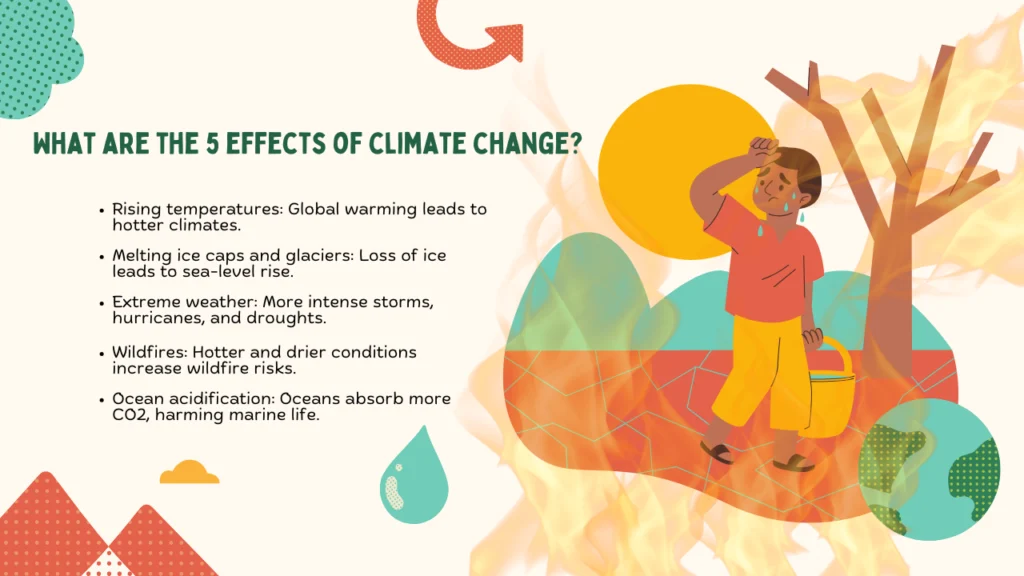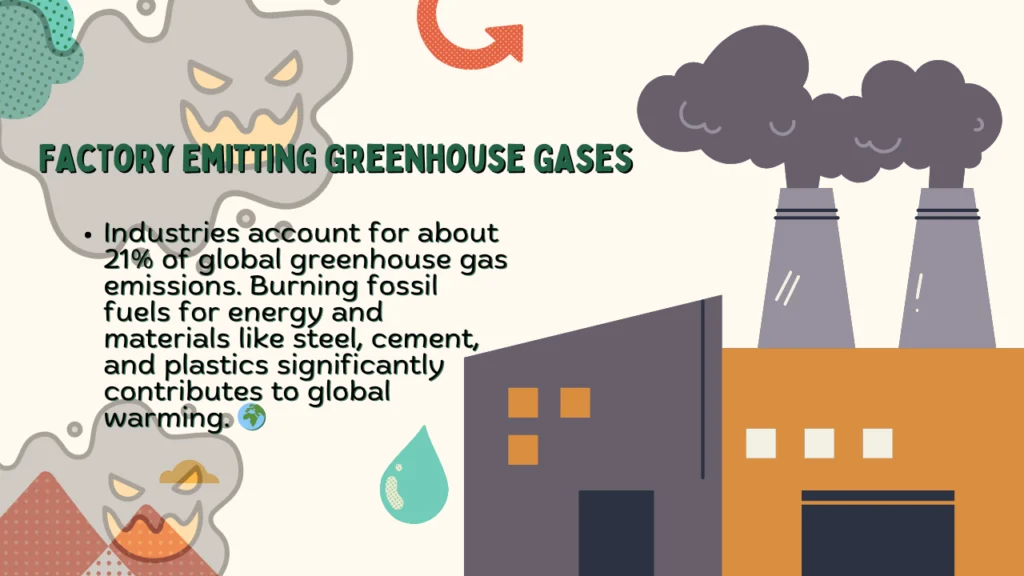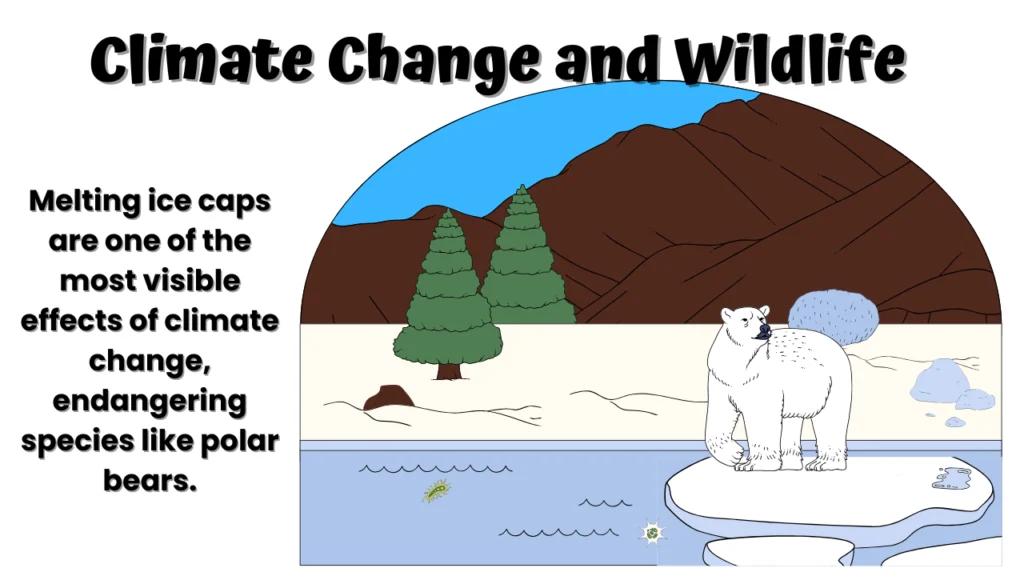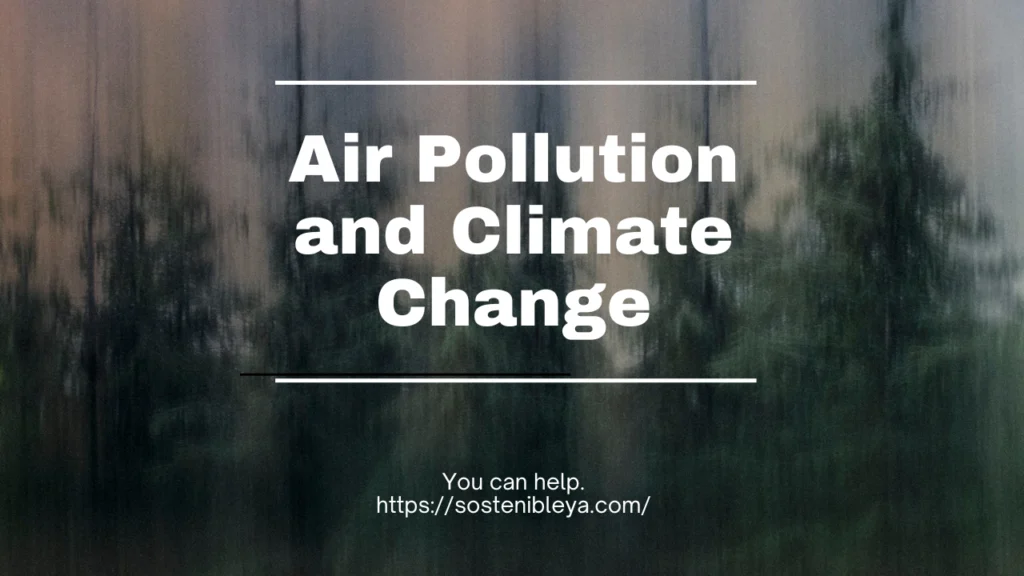What is Climate Change? 🌍

Climate change refers to long-term shifts in global temperatures and weather patterns, largely due to human activities. Since the 19th century, the burning of fossil fuels like coal, oil, and gas has significantly increased the levels of greenhouse gases in the atmosphere, trapping heat and raising global temperatures. While climate change can also be driven by natural causes like volcanic eruptions or solar variations, human-caused climate change is the most pressing issue today.
Causes of Climate Change 🔥
The main cause of current climate change is human activity, particularly the emission of greenhouse gases like carbon dioxide (CO2) and methane (CH4). These gases are primarily released from the burning of fossil fuels for electricity, heat, and transportation. Deforestation and industrial activities also contribute heavily to the problem, as they release stored carbon into the atmosphere, reducing the planet’s natural ability to absorb CO2.
The Effects of Climate Change 🌡️
The impacts of climate change are already being felt across the globe, and they are expected to worsen. Some of the key effects of climate change include:
- Rising global temperatures: The Earth’s average temperature has risen by approximately 1.2°C since the late 19th century, and is expected to rise further unless emissions are dramatically reduced. For more information on how emissions impact the environment, you can explore our article on What is Pollution and Emissions?
- Melting ice caps and glaciers: As temperatures rise, Arctic sea ice is shrinking, glaciers are retreating, and ice sheets in Greenland and Antarctica are losing mass. This contributes to sea-level rise.
- More extreme weather events: Heatwaves, droughts, and intense storms like hurricanes and typhoons are becoming more frequent and severe due to climate change.
- Ocean acidification: Increased CO2 levels are causing the oceans to absorb more carbon, making them more acidic and threatening marine life.
- Disruption of ecosystems: Many species are shifting their habitats, migrating earlier, or facing extinction as ecosystems are altered by climate change.
Regional Impacts of Climate Change in the United States 🌪️
Climate change affects different regions in distinct ways. Here’s a summary of regional impacts in the U.S.:
- Northeast: Heatwaves and sea-level rise are threatening infrastructure, fisheries, and agriculture.
- Northwest: Water shortages and increased wildfire risk due to changing precipitation patterns.
- Southeast: Sea-level rise and extreme heat are threatening coastal cities and ecosystems.
- Midwest: Increased flooding and extreme weather events are affecting agriculture and infrastructure.
- Southwest: Droughts and wildfires are more frequent, reducing water availability and increasing fire risk.
Is Climate Change Reversible? 🌡️
Some of the effects of climate change are irreversible, at least in the short term. For instance, the melting of polar ice caps and sea-level rise cannot be undone quickly. However, scientists agree that with urgent action, the most catastrophic consequences can still be avoided. Reducing global greenhouse gas emissions, increasing the use of renewable energy, and protecting natural ecosystems are critical steps.
Solutions to Combat Climate Change 🌱
There are many solutions to climate change, which can not only reduce emissions but also create economic and social benefits. Some of these include:
- Transitioning to renewable energy: Solar, wind, and geothermal energy offer alternatives to fossil fuels.
- Energy efficiency: Improving energy efficiency in homes, industries, and transportation can significantly reduce emissions.
- Reforestation: Planting trees and protecting forests help to absorb CO2 from the atmosphere.
- Carbon pricing: Economic policies that tax carbon emissions or set limits on them encourage businesses to reduce their environmental footprint.
Conclusion: A Global Call to Action 🌍
Climate change is one of the greatest challenges humanity has ever faced. Its effects are already apparent, but the future still holds a window of opportunity to mitigate the worst outcomes. Immediate and concerted global action is essential. Reducing emissions, adopting sustainable practices, and supporting policies aimed at curbing climate change will help secure a livable future for generations to come.
FAQs: Climate Change 🌍
How does climate change affect our lives?
Climate change affects our lives by increasing the frequency of extreme weather events, such as heatwaves, storms, and floods. It also impacts agriculture, leading to food shortages and higher prices, and contributes to rising sea levels that threaten coastal communities. Additionally, it can cause health issues such as heat-related illnesses and the spread of diseases.
What are the 7 effects of climate change?
Rising temperatures: Global warming leads to hotter climates.
Melting ice caps and glaciers: Loss of ice leads to sea-level rise.
Extreme weather: More intense storms, hurricanes, and droughts.
Wildfires: Hotter and drier conditions increase wildfire risks.
Ocean acidification: Oceans absorb more CO2, harming marine life.
Biodiversity loss: Habitat changes lead to species extinction.
Changes in agriculture: Crop yields are affected by unpredictable weather patterns.
Why should we stop climate change?
Stopping climate change is essential to prevent catastrophic impacts on ecosystems, human health, and economies. Reducing greenhouse gas emissions can mitigate extreme weather, protect biodiversity, and ensure a livable planet for future generations. It also helps in maintaining food security and preventing displacement of people due to sea-level rise and resource shortages.
What can humans do to stop climate change?
Humans can take several actions to stop climate change, such as:
Reducing fossil fuel consumption by switching to renewable energy.
Promoting energy efficiency in homes and industries.
Reducing deforestation and supporting reforestation projects.
Choosing sustainable transportation, like biking or using electric vehicles.
Advocating for policies that limit carbon emissions and encourage green practices.
Will the Earth cool down again?
Without significant reductions in greenhouse gas emissions, the Earth will continue to warm. However, if we take drastic action now, it is possible to slow or stop the rate of warming. Over long periods, some cooling could occur as greenhouse gas levels decrease, but this will take centuries.
Is it too late to fix climate change?
It is not too late to mitigate the worst impacts of climate change, but time is running out. Immediate action is needed to reduce greenhouse gas emissions and transition to a more sustainable economy. Every degree of warming we can prevent will reduce the severity of climate impacts.



